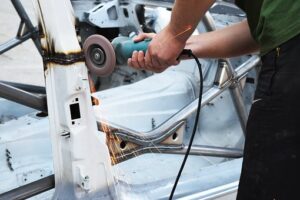Advanced manufacturing techniques and processes in automobile manufacturing
The automobile manufacturing industry is constantly evolving, with advancements in technology and manufacturing techniques playing a significant role in improving efficiency and reducing costs. Advanced manufacturing techniques and processes have revolutionized automobile manufacturing, leading to significant improvements in the quality of vehicles produced, as well as faster and more efficient production processes.
This article will examine the role of advanced manufacturing techniques and processes in automobile manufacturing.
One of the most significant advancements in automobile manufacturing has been the use of robotics. Robots are now widely used in automobile manufacturing, performing tasks such as welding, painting, and assembling components. The use of robotics has led to significant improvements in efficiency, as robots can perform tasks more quickly and accurately than humans. Additionally, the use of robots has improved safety in the workplace, as robots can perform tasks that are dangerous for humans.
Another advanced manufacturing technique that is widely used in automobile manufacturing is additive manufacturing, also known as 3D printing. Additive manufacturing allows manufacturers to create complex parts and components more quickly and efficiently than with traditional manufacturing methods. This technique also allows manufacturers to create custom components on demand, reducing the need for large inventories of parts and reducing waste.
The use of advanced materials is another technique that is becoming increasingly important in automobile manufacturing. Lightweight materials such as carbon fiber and aluminum are now widely used in vehicle manufacturing, as they reduce weight and improve fuel efficiency. Additionally, new materials such as graphene and nanotubes are being developed, which have the potential to further improve the performance of vehicles.
Advanced software and simulation tools are also playing an increasingly important role in automobile manufacturing. Computer-aided design (CAD) and computer-aided manufacturing (CAM) software are used to design and simulate the production of vehicles, allowing manufacturers to test different designs and production processes before they are implemented. This helps to reduce the risk of errors and improve the quality of the vehicles produced.
Another advanced manufacturing technique that is becoming more prevalent in automobile manufacturing is the use of automation. Automation allows for faster and more efficient production processes, reducing the time and cost required to produce vehicles. Automated systems can perform tasks such as moving materials and components, assembly, and inspection. This allows manufacturers to produce vehicles more quickly and with greater accuracy.

The Internet of Things (IoT)
Playing an increasingly important role in automobile manufacturing. IoT devices can be used to monitor and control various aspects of the manufacturing process, including production equipment, inventory, and quality control. This helps manufacturers to identify and address issues in real-time, improving the efficiency and quality of the production process.
Virtual reality (VR) and augmented reality (AR)
Becoming more prevalent in automobile manufacturing. These technologies can be used to simulate the production process and allow manufacturers to test and refine different production processes before they are implemented. Additionally, AR technology can be used to provide workers with real-time information and guidance, improving the efficiency and accuracy of their work.
The Internet of Things, and VR/AR technologies are all contributing to improvements in the efficiency, quality, and safety of the production process. As technology continues to evolve, we can expect to see further advancements in automobile manufacturing, leading to even greater improvements in the vehicles produced.
However, it is important to note that the adoption of advanced manufacturing techniques and processes is not without its challenges. The initial investment required to implement these technologies can be significant, and there may be a learning curve for workers who are accustomed to traditional manufacturing methods. Additionally, there may be concerns about job displacement as some tasks previously performed by humans are now being automated. minimized and that workers are able to transition to new roles within the company.
Furthermore, as automobile manufacturing becomes more complex and reliant on technology, cybersecurity concerns become increasingly important. Manufacturers must take steps to protect their production systems from cyber threats, including implementing secure networks and ensuring that employees are trained in cybersecurity best practices.
In addition to these challenges, there are also environmental concerns that must be addressed in automobile manufacturing. While the use of lightweight materials can improve fuel efficiency and reduce emissions, the manufacturing process itself can also continue to evolve. From robotics and additive manufacturing to advanced materials and software and simulation tools, these technologies are improving the efficiency, quality, and safety of the production process.
However, manufacturers must also be aware of the challenges and potential risks associated with the adoption of these technologies, including job displacement, cybersecurity concerns, and environmental impacts. By addressing these challenges and working proactively to address them, manufacturers can continue to drive innovation and improve the vehicles produced for the benefit of consumers and the industry as a whole.

Finally, it is worth noting that the adoption of advanced manufacturing techniques and processes is not only impacting automobile manufacturing but also the wider manufacturing industry. As manufacturers continue to invest in these technologies, there is the potential for significant improvements in the efficiency and quality of manufacturing processes across industries.
Additionally, as technology continues to evolve, there is the potential for further advancements in automobile manufacturing beyond those discussed in this article. For example, the development of artificial intelligence and machine learning technologies could lead to even greater improvements in the efficiency and quality of the production process. Similarly, the use of blockchain technology could improve supply chain transparency and reduce waste.
Overall
The role of advanced manufacturing techniques and processes in automobile manufacturing is significant and continues to evolve. These technologies are improving the efficiency, quality, and safety of the production process, while also presenting challenges and potential risks that must be addressed. As the industry continues to evolve, manufacturers must be proactive in adopting new technologies and addressing associated challenges, while also working to drive innovation and improve the vehicles produced for the benefit of consumers and the industry as a whole.












